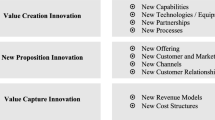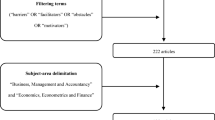Abstract
Unlike innovation based on a strong professional culture involving close collaboration between professionals in academia and/or corporations, the current Free/Libre Open Source Software (FLOSS) development entails a global knowledge network, which consists of 1) a heterogeneous community of individuals and organizations who do not necessarily have professional backgrounds in computer science but have developed the competency to understand programming and working in a public domain; 2) corporations. This paper describes the operation of the hybrid form of developing and implementing software, and also identifies several key factors shaping the collaboration between FLOSS firms and the community.
Similar content being viewed by others
References
Cancilla, J. 2003. Open Source Software for Windows. TechSoup.org. 〈http://www.techsoup.org/howto/articlepage.cfm?ArticleId=523&topicid=2〉.
Lave, J. & Wenger, E. 1991. Situated Learning: Legitimate Peripheral Participation. Cambridge University Press.
Lin, N. & Cook, K. & Burt, R. S. (Eds.) 2001. Social Capital: Theory and Research. New York: Aldine de Gruyter.
Lin, Y.-W. 2004a. Hacking Practices and Software Development: A Analysis of ICT Innovation and the Role of Open Source Software. Unpublished doctoral thesis. Department of Sociology, University of York, UK.
Lin, Y.-W. 2004b. ‘Epistemologically Multiple Actor-Centered Systems: or, EMACS at work!’. Ubiquity, Volume 5, Issue 1, February 25 – March 2, 2004. 〈http://www.acm.org/ubiquity/views/v5il_lin.html〉.
McKelvey, M. 2001. Internet Entrepreneurship: Linux and the dynamics of open source software, CRIC Discussion Paper no. 44. Centre for Research on Innovation and Competition, The University of Manchester & UMIST.
Rossi, C. 2003. The Economics of Open Soruce Software: Incentives, Coordination and Diffusion. PhD thesis. SSSUP, Italy.
Stallman, R. The Emacs Full-Screen Editor URL (consulted 27 November 2003): 〈http://www.lysator.liu.se/history/garb/txt/87-1-emacs.txt〉.
Star, S. L., Bowker, G. C., Neumann L. J. 2003. Transparency beyond the Individual Level of Scale: Convergence between Information Artifacts and Communities of Practice in the book Digital library use: social practice in design and evaluation, edited by Ann Peterson Bishop, Nancy A. Van House, and Barbara P. Buttenfield. The MIT press.
Torvalds, L. & Diamond, D. 2002. Just For Fun: The Story of an Accidental Revolutionary. Texere Publishing.
Author information
Authors and Affiliations
Additional information
She received her Ph.D. in sociology from the University of York (UK) in 2004. Her Ph.D. research investigated the heterogeneity and contingency in the Free/Libre Open Source Software (FLOSS) social worlds, which is based on a constellation of hacking practices, from the sociological perspective. Her principal research interests center on FLOSS studies, Science and Technology Studies (STS), virtual communities and knowledge management.
Rights and permissions
About this article
Cite this article
Lin, Y. Hybrid innovation: The dynamics of collaboration between the FLOSS community and corporations. Know Techn Pol 18, 86–100 (2006). https://doi.org/10.1007/s12130-006-1005-7
Issue Date:
DOI: https://doi.org/10.1007/s12130-006-1005-7




